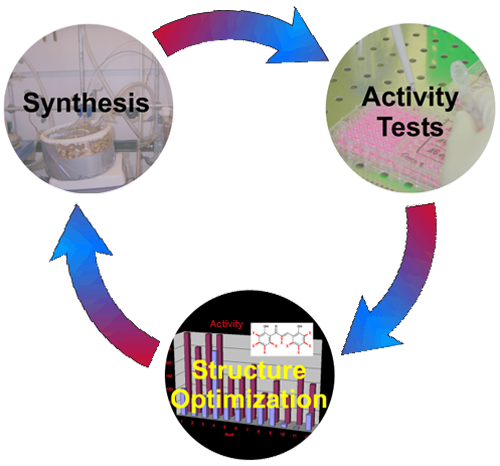 Fakultäten
Fakultäten

In order to establish natural products or derivatives of them as potential drug candidates, an evaluation concerning their biological activity is necessary. Therefore so-called bioassays are carried out, which are model systems for biological processes or reactions, respectively. This approach allows for a directed examination of such systems.
The determination of the biological and pharmacological activity of small organic molecules is an important aspect of Bioorganic and Medicinal Chemistry, which allows for the classification and comparability of compounds as well as classes of compounds concerning defined biological parameters.
An always current and important field of research is the examination of inflammatory processes which are crucial in all parts of medicine. Inflammations are reactions of the immune system on damages which are caused by infections, the invasion of the body by unknown compounds or from other reasons, like for example cell necroses after injuries. The control of inflammatory processes is an important therapeutic goal that needs to be achieved from organ transplantations to rheumatic diseases.
Chronic inflammations, which can potentially be autoimmune diseases, are a major topic in research on inflammation. The patients suffer frequently from ailments like pain and strong swellings which limits the ability to move especially within rheumatic conditions.
There is a vast number of target structures on which anti-inflammatory compounds can act. Many of the known drugs such as glukocortikosteroids or antibodies against inflammation mediators raise the risk of infections because they have immunosuppressive properties. An alternative is the development of anti-inflammatory agents which do not raise the risk of infections significantly. Additionally, many anti-inflammatory acting compounds are limited in their therapeutical use due to side effects especially in long term treatments. Therefore it is necessary to find active anti-inflammatory drugs with little or no side effects which can be used in long term treatments.
Heme oxygenase-1 (HO-1) is an anti-inflammatory acting protein, whose gene and protein expression is induced by numerous influences and stimuli. In this extremely diverse group are examples like UV-irradiation, cadmium, ethanol, heat shock, oxidative stress and a big number of small organic molecules. Amongst those are many compounds which contain α,β-unsaturated carbonylsubstructures.